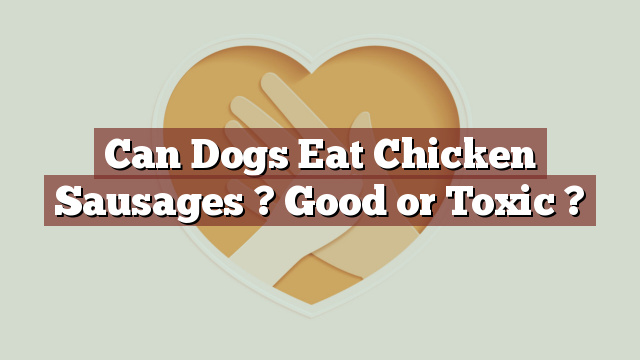Can Dogs Eat Chicken Sausages? Good or Toxic?
As responsible pet owners, it is crucial to be aware of what foods are safe for our furry friends. Dogs have different dietary requirements compared to humans, and certain foods that we enjoy may not be suitable for them. In this article, we will explore whether it is safe for dogs to consume chicken sausages and the potential risks and benefits associated with feeding them this popular food.
Nutritional Value of Chicken Sausages for Dogs
Chicken sausages are a common food made from ground chicken meat, mixed with various spices and seasonings. While they can be a tasty treat for humans, it is important to consider their nutritional value for dogs. Chicken is a lean source of protein, which is essential for building and repairing tissues in their bodies. Additionally, chicken sausages may contain other nutrients such as vitamins B6 and B12, niacin, and iron.
Are Chicken Sausages Safe or Toxic for Dogs?
Can dogs eat chicken sausages? The answer is yes, but with caution. While chicken meat itself is generally safe for dogs, the sausages may contain additional ingredients that could be harmful to them. Some sausages may contain high levels of sodium, spices, and seasonings that can cause gastrointestinal upset, such as diarrhea or vomiting, in dogs. Moreover, certain seasonings like onion or garlic powder can be toxic to dogs in large quantities.
Potential Risks and Benefits of Feeding Dogs Chicken Sausages
Feeding your dog chicken sausages can pose both risks and benefits. On one hand, the high sodium content in sausages can lead to dehydration and electrolyte imbalances in dogs, especially if consumed in large quantities. Additionally, the presence of spices and seasonings in sausages can irritate a dog’s digestive system.
On the other hand, chicken sausages can be a good source of protein for dogs. Protein is important for their overall health, as it helps in muscle development and repair. If you choose to feed your dog chicken sausages, it is recommended to opt for those with minimal additives, preservatives, and sodium content.
What to Do if Your Dog Eats Chicken Sausages
If your dog accidentally consumes chicken sausages, it is important to monitor their behavior and health. If your dog shows signs of gastrointestinal distress, such as vomiting or diarrhea, it is advisable to contact your veterinarian immediately. They will be able to assess the situation and provide appropriate guidance on how to manage any potential complications.
Additionally, it is always a good idea to consult your veterinarian before introducing any new food into your dog’s diet. They can provide personalized advice based on your dog’s specific needs and health conditions.
Conclusion: Understanding the Impact of Chicken Sausages on Dogs
In conclusion, while dogs can eat chicken sausages, it is important to exercise caution and moderation. The presence of spices, seasonings, and high sodium content in some sausages may pose risks to a dog’s health. It is advisable to choose sausages with minimal additives and to feed them in moderation. As always, consulting with a veterinarian is crucial to ensure the well-being of our beloved pets.
Thank you for investing your time in exploring [page_title] on Can-Eat.org. Our goal is to provide readers like you with thorough and reliable information about various dietary topics. Each article, including [page_title], stems from diligent research and a passion for understanding the nuances of our food choices. We believe that knowledge is a vital step towards making informed and healthy decisions. However, while "[page_title]" sheds light on its specific topic, it's crucial to remember that everyone's body reacts differently to foods and dietary changes. What might be beneficial for one person could have different effects on another. Before you consider integrating suggestions or insights from "[page_title]" into your diet, it's always wise to consult with a nutritionist or healthcare professional. Their specialized knowledge ensures that you're making choices best suited to your individual health needs. As you navigate [page_title], be mindful of potential allergies, intolerances, or unique dietary requirements you may have. No singular article can capture the vast diversity of human health, and individualized guidance is invaluable. The content provided in [page_title] serves as a general guide. It is not, by any means, a substitute for personalized medical or nutritional advice. Your health should always be the top priority, and professional guidance is the best path forward. In your journey towards a balanced and nutritious lifestyle, we hope that [page_title] serves as a helpful stepping stone. Remember, informed decisions lead to healthier outcomes. Thank you for trusting Can-Eat.org. Continue exploring, learning, and prioritizing your health. Cheers to a well-informed and healthier future!

